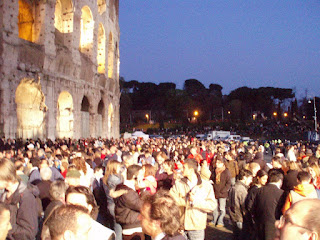Having been to Salisbury Cathedral the last time I was in the UK, I didn't expect to see much that would surprise me. The baptismal font (see post below) was the first indicator that I was wrong. Since the church is, as I mentioned, a living and active congregation, it makes some changes in its architecture and decoration as well. For instance, I recall the last time I was there the Cathedral had set up one of its chapels as a special place to pray for the farming families affected by hoof and mouth disease, which was destroying livestock at that time. Since the epidemic has passed, the memorial is dismantled.
 One thing I cannot recall seeing before is a candle in barbed wire, the symbol of Amnesty International and a general symbol for remembrance of prisoners of conscience. In fact, the gorgeous blue stained glass window at the back of the church, right behind the candle, was only constructed in the 1980s as a memorial and tribute to prisoners of conscience around the world. (Apparently its illusory, modern design is a bit of a scandal to some.) In all, the set up in the oldest part of the church makes for a very moving place of reflection and prayer.
One thing I cannot recall seeing before is a candle in barbed wire, the symbol of Amnesty International and a general symbol for remembrance of prisoners of conscience. In fact, the gorgeous blue stained glass window at the back of the church, right behind the candle, was only constructed in the 1980s as a memorial and tribute to prisoners of conscience around the world. (Apparently its illusory, modern design is a bit of a scandal to some.) In all, the set up in the oldest part of the church makes for a very moving place of reflection and prayer.For most people, prisoners are people who deserve what they've gotten. People go to prison for crimes they've committed, and whether you think jail is punishment, rehabilitation, or prohibition, if you end up there you broke the law and deserve little mercy. But what if the law itself is unjust? What if jail accomplishes one of its purposes and you are rehabilitated - only to await your death, either imposed or eventual? And what of the fact that we are all created good by God and deserving of mercy, no matter our crimes?
Nowhere are these questions more painful than in the face of prisoners of conscience. Because of their beliefs - usually against corrupt governments or painful oppression - these people are locked away. In countries where free speech and dissension have some kinds of protections, these kinds of prisoners sound like myths. But they are real, and we are called to defend and protect them.
Better yet, Christ calls us to help those imprisoned no matter what their crime. Jesus' story in Matthew 25 doesn't qualify only non-violent prisoners, he simply says "in prison". While it is exhausting, sometimes self-destructive work, those who serve and minister to people in prison are doing some of the most important ministry at all. This candle in Salisbury reminded me not only of those in prison unjustly, but those in prison at all - and especially, those who give everything they have to reach out to those prisoners.
Gracious God, who loves sinners, we know we all fall short of your intent for our lives. We point fingers at those who the world punishes more harshly for their sins, all the while ignoring your command to love them no matter what. Forgive us all our sins, and grant us each the strength to serve you through the least of these. Be with those jailed for whatever reason, that they might know of your love and forgiveness no matter what. Through Christ our Lord, Amen.








